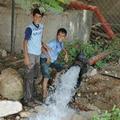水資源是人類基本人權?抑或基本需求?
 20個國家已經正式對在為期一周的世界水資源論壇閉幕式發表的部長宣言提出質疑,該宣言認定水資源屬於人類基本需求,而非基本人權的一部份。
20個國家已經正式對在為期一周的世界水資源論壇閉幕式發表的部長宣言提出質疑,該宣言認定水資源屬於人類基本需求,而非基本人權的一部份。
拉丁美洲國家在反宣言的連署中扮演關鍵角色,該份反宣言認定水資源和衛生環境的獲得屬於基本人權,並承諾將採取一切必要行動來漸次實行此一權利。
在反宣言上簽字的國家包括︰孟加拉、貝南、玻利維亞、查德、智利、古巴、厄瓜、衣索比亞、瓜地馬拉、宏都拉斯、摩洛哥、那米比亞、尼日、巴拿馬、巴拉圭、南非、西班牙、斯里蘭卡、烏拉圭,和委內瑞拉。雖然正式的連署預計費時數月,但瑞士已表態支持。
由美國國務院環境暨永續發展副部長雷夫斯奈德(Daniel Reifsnyder)率領的美國代表團,採取與大會相同立場,「目前並未存在各國廣泛同意的水權或水的基本人權, 對於這項權利的內涵也未達成共識
。」國務院發言人倫恩(Andy Laine)如此表示。
這份部長宣言並未在水資源論壇公開進行協商,相關陳述的討論於3月3日和4日在巴黎舉行的籌備會議已達成結論。
倫恩表示在籌備過程中,美國確實反對可能承認水為基本人權的用語。「美國不反對任何政府將國家的水權或衛生權利作為其國內政策的一部分。但是,我們對於要求所有國家均採取國家水權或衛生權利,或要求建立國際水權或者衛生權利的陳述有相當大的保留。」
「對於任何事而言,建立一個國際性的權利往往引發許多複雜的問題,包括權利性質、如何實行權利、那一方需負相關責任以確保所有權利。到目前為止,各國政府並未就這些問題有過正式討論。同意此項權利的時機尚未成熟。」倫恩說。
其他支持水資源為人類基本需求而非基本人權的政府,包括巴西、加拿大、埃及,和歐盟。非政府組織和聯合國已發起活動,遊說各國政府承認水資源為基本人權。
位於華盛頓特區的非政府組織,「食物與水監督組織」要求其成員發電子郵信給所屬眾議員,敦促他們支持將水資源列入基本人權。他們的訴求與國務院立場相抵,「當人們還在爭論水權和衛生權利的國際共識尚未存在,這項權利已出現在聯合國的兩份部長級的宣言中。」
 聯合國大會主席布羅克曼(Miguel
聯合國大會主席布羅克曼(Miguel
D'Escoto)資深水資源顧問
加拿大人巴羅(Maude Barlow)則明確表示,水資源是公眾信託的資產,來自人類和自然的共同遺產,也是基本人權。我們必須挑戰水是在公開市場供買賣的商品的看法。那些致力於私有化水資源的人,不就如同拒絕人們擁有基本呼吸人權一樣?
聯合國主席也質疑論壇的合法性。他的演說提及,「 該論壇的走向深受私人自來水公司的影響。很明顯地,世界水資源會議主席和輪值主席均和私人自來水服務事業有深厚關係。」
也擔任加拿大人委員會國家主席的巴羅,把總理的訊息傳遞到人民水資源論壇,一個由近70餘國公民團體組成的反對論壇,其主張未曾在世界水資源論壇發表。這段演說隨後在來自150國2千5百名代表與會的世界水資源論壇上播放。
教宗本篤16世2008年7月呼籲承認水資源為基本人權。在國際水資源與衛生展覽西班牙會場,主教說「水資源的使用,一般認為是普遍且不能讓與的權利,與生活在赤貧的人口增長和急迫需求有關,限制飲用水會對人類福祉上造成巨大影響,更經常是疾病、痛苦、衝突、貧困,甚至是死亡的原因。」
約8.8億人無法擁有清潔飲用水,而有25億人不能擁有衛生環境,經濟合作與發展組織上周在一份報告裡提及。
代表主要大型公司現身在伊斯坦堡的世界永續發展商務委員會說,3月26日在水、能源、氣候變遷,以及其與食物間的關聯,是這次重要的討論題目,必須即刻進行。
世界企業永續發展協會(WBCSD) 森林和生態系統常務董事詹姆士‧葛里菲玆(James Griffiths)說,「是時候在全球氣候談判中連結水、能源、食物和氣候變遷,讓政府和其他組織與業界合作並引入其專業技能;並由公部門和私部門合夥型態來解決的世界最緊迫的水資源問題。」
部長宣言列舉一套非強制性的建議,包括擴大合作以緩和水資源爭議、宣傳缺乏水資源和食物的措施、更佳化的資源管理,以及控制的河、湖、含水層的污染。世界水資源論壇每三年召開一次 - 下次會議預定在2012年舉辦。
Twenty countries have officially challenged the Ministerial Declaration released Sunday at the close of the week-long World Water Forum because it defines water as a human need rather than as a human right.
Latin American states played a key role in gathering signatures on a counter-declaration that recognizes access to water and sanitation as a human right and commits to all necessary action for the progressive implementation of this right.
Countries that signed the counter-declaration are: Bangladesh, Benin, Bolivia, Chad, Chile, Cuba, Ecuador, Ethiopia, Guatemala, Honduras, Morocco, Namibia, Niger, Panama, Paraguay, South Africa, Spain, Sri Lanka, Uruguay and Venezuela. Switzerland has declared its support although a formal signature is expected to take months to finalize.
The U.S. delegation, led by Daniel Reifsnyder, deputy assistant secretary of state for environment and sustainable development, took the position that "there is at present no internationally agreed right to water or human right to water, and there is no consensus on what such a right would encompass," according to State Department spokesman Andy Laine.
The Ministerial Declaration was not open to negotiation at the World Water Forum as negotiations on the statement were concluded at a preparatory meeting held in Paris on March 3 and 4.
Laine told ENS that during the preparatory process the United States did oppose language that would have recognized water as a human right.
"The United States does not oppose any government adopting a national right to water or sanitation as part of its own domestic policy. We do, however, have concerns with a statement that would require all countries to adopt a national right to water or sanitation or would establish an international right to water or sanitation," Laine said.
"Establishing an international right to anything raises a number of complicated issues regarding the nature of that right, how that right would be enforced, and which parties would bear responsibility for ensuring these rights are met," said Laine. "To date, there have been no formal intergovernmental discussions on these issues. It would therefore be premature to agree to such a right."
Other governments supporting the principle of water as a human need, rather than are human right, are Brazil, Canada, Egypt and the European Union.
Nongovernmental organizations and the United Nations have mounted a campaign to lobby governments to recognize water as a human right.
The Washington, DC-based NGO Food and Water Watch asked its members to send emails to their Congressional representatives urging them to support water as a human right. Their appeal counters the State Department position, saying, "While it has been argued that there is no international consensus on the existence of a right to water and sanitation, such rights have been enshrined in two ministerial-level declarations of the United Nations."
Maude Barlow, a Canadian national who serves as senior advisor on water to UN General Assembly President Miguel Dscoto, delivered a statement from him in Istanbul. Dscoto was clear, ater is a public trust, a common heritage of people and nature, and a fundamental human right. ... We must challenge the notion that water is a commodity to be bought and sold on the open market. Those who are committed to the privatization of water ... are denying people a human right as basic as the air we breathe.?
The UN president also questioned the legitimacy of the forum itself. His speech stated, "The forum's orientation is profoundly influenced by private water companies. This is evident by the fact that both the president of the World Water Council and the alternate president are deeply involved with provision of private, for-profit, water services."
Barlow, who is also the national chairperson of the Council of Canadians, delivered the president's message to the People's Water Forum, a counter-forum held by hundreds of civil society members from nearly 70 countries whose voices have not been at the formal World Water Forum. The speech was later released to the World Water Forum, which was attended by 25,000 delegates from 150 countries.
Pope Benedict XVI last July called for recognition of the right to water. In his message to the international exposition on Water and Sustainable Development Spain, the pontiff said, "The use of water, which is regarded as a universal and inalienable right, is related to the growing and urgent needs of people who live in destitution, taking into account the fact that limited access to potable water has repercussions on the wellbeing of an enormous number of people and is often the cause of illnesses, sufferings, conflicts, poverty and even death."
Some 880 million people do not have access to clean drinking water, while 2.5 billion people do not have access to sanitation, the Organization for Economic Co-operation and Development said in a report last week.
The World Business Council for Sustainable Development, which represented major corporations in Istanbul, said Thursday that the linkages between water, energy and climate change, as well as their connections with food were important topics of discussion at the Forum and they must be addressed immediately.
James Griffiths, managing director of water, forests and ecosystems at the WBCSD, said, "It is time to link water, energy, food and climate change in global climate negotiations, for governments and other groups to engage with business and tap into its expertise; and for public-private partnerships to be set up to solve some of the world's most pressing water problems."
The Ministerial Declaration listed a set of non-binding recommendations, including greater cooperation to ease disputes over water, measures to address floods and water scarcity, better management of resources and curbing pollution of rivers, lakes and aquifers.
The World Water Forum is held every three years - the next meeting is scheduled for 2012.

